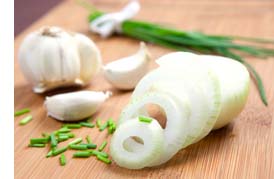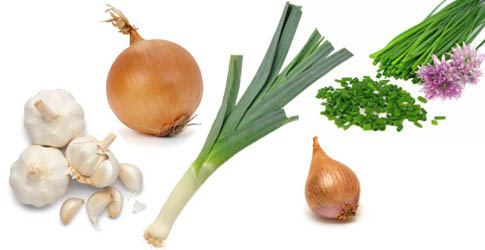The Wonderful World of Alliums
- By The FruitGuys
- Reading Time: 3 mins.
 There is nary a cuisine that doesn’t include allium vegetables. Onions, garlic, leeks, shallots, and scallions are all members of the Allium genus and are fundamental to so many dishes that cooking without them would be challenging. Although rich in flavor, they seem to disappear in many sauces, stews, and soups, and it can be easy to forget their presence unless you were the one tearing up while chopping them. Yet these humble flowering plants pack a nutrient punch.
There is nary a cuisine that doesn’t include allium vegetables. Onions, garlic, leeks, shallots, and scallions are all members of the Allium genus and are fundamental to so many dishes that cooking without them would be challenging. Although rich in flavor, they seem to disappear in many sauces, stews, and soups, and it can be easy to forget their presence unless you were the one tearing up while chopping them. Yet these humble flowering plants pack a nutrient punch.
A wide array of sulfur compounds gives onions, garlic, and other alliums their characteristic taste, smell, and tear-inducing pungency as well as their many health benefits, including cardiovascular protection, anti-cancer activity, lowering blood levels of cholesterol and triglycerides, lowering blood pressure, and providing anti-clotting benefits. Alliums also contain polyphenols, including the flavonoid quercetin, which along with many of the sulfur compounds have important anti-inflammatory effects.
How to Maximize Their Benefits
To maximize the concentration of beneficial sulfur compounds, allow chopped onions, crushed or minced garlic, sliced leeks, or other alliums to sit for a few minutes before cooking or adding to an acid, such as vinegar or lemon juice. This allows the enzymes released when the alliums’ cells are broken to more completely react with sulfur-containing molecules and convert them to beneficial forms.
Want farm-fresh fruit?
We've got you covered.
Since letting chopped onions sit also increases the tear-inducing side effect of these sulfur compounds, you might want to try chilling whole onions for an hour before chopping to reduce their airborne particles. Alliums (Latin for “garlic”) evolved their pungent odors and tastes to deter hungry animals, but humans, ironically, have singled them out specifically for those characteristics.

Garlic, bulb onions, leeks, shallots, and chives are just a few of the most common allium culinary varieties. In most cases, the leaves, flowers, and bulbs are edible. Shallots—sometimes confused with scallions, which are fresh green onions—are pink-toned and resemble a large clove of garlic in shape but are made up of layers like an onion. Their sweet and light garlicky taste works well in salads and dressings, but they can also replace onions in recipes. There are also many allium family members that are grown as ornamental flowers.
Magical Properties
Garlic’s antibacterial and antiviral properties have been known for longer than bacteria themselves. Garlic and Other Alliums: The Lore and the Science, by Eric Block, note that onions, garlic, and leeks are base ingredients for Mesopotamian recipes dating back to 1700 BC. Folklore gives garlic the power to protect against monsters such as vampires and werewolves. Recently, studies have found that garlic shows promise in treating some bacterial infections that have developed antibiotic resistance and may prevent infection from developing in serious burns.
A 2009 study by the Medical University of South Carolina showed that alliums might help prevent osteoporosis. Frequent consumption of onions in particular improved bone density by 5 percent in perimenopausal and postmenopausal white women. The same study found that among older women, the most frequent consumers of onions had a 20 percent risk reduction of hip fractures compared to those who did not consume onions.
Want farm-fresh fruit?
We've got you covered.
Fresh Allium Season
Dried, or cured garlic and onions can be found year-round at markets, but spring is a chance to try some of the less well-known allium varieties. Garlic scapes are curly green shoots of garlic bulbs with a subtler flavor than most allium vegetables; ramps, or wild leeks, are deliciously grilled, added to egg dishes, or pickled; green garlic is immature garlic with a mellower taste than the mature cloves; spring onions are more developed than scallions and less developed than mature onions; and chive flowers are a lovely addition to scrambled eggs and salads.


